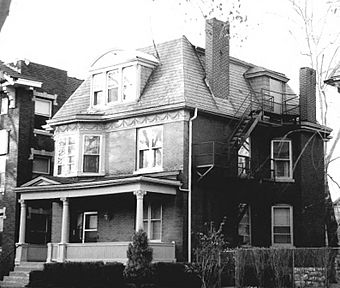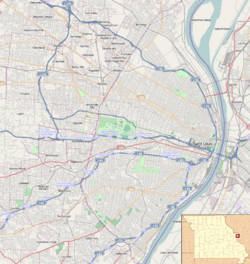Joseph Erlanger House facts for kids
|
Joseph Erlanger House
|
|

Joseph Erlanger House, 1975 Park Service photo
|
|
| Location | 5127 Waterman Blvd., St. Louis, Missouri |
|---|---|
| Built | 1903 |
| NRHP reference No. | 76002234 |
Quick facts for kids Significant dates |
|
| Added to NRHP | December 8, 1976 |
| Designated NHL | December 8, 1976 |
The Joseph Erlanger House is a special old house in St. Louis, Missouri. It's known as a National Historic Landmark. This means it's a very important place in American history. The house is famous because it was the home of Joseph Erlanger. He was a brilliant American doctor and physiologist (a scientist who studies how living things work).
Dr. Erlanger won the Nobel Prize in medicine in 1944. He received this huge honor for his amazing discoveries about how our nerves work. He lived in this house from 1917 until he passed away in 1965. The house became a National Historic Landmark in 1976. However, it is a private home and not open for public visits.
About the Erlanger House
The Erlanger House is located in the Forest Park area of St. Louis. You can find it on Waterman Boulevard. It is a two-story building made of brick. The house has a sloped roof with windows sticking out, called dormers.
The front of the house has a porch that goes all the way across. There is a rounded window section above the main door. Another two-story section sticks out from the right side. Inside, the house has a common layout with a hallway on one side.
Joseph Erlanger's Discoveries
The house was built around 1903. Dr. Joseph Erlanger bought it in 1917. He raised his family here and lived in the house while working at Washington University in St. Louis. He lived there for the rest of his life.
Erlanger studied at Johns Hopkins University. He first became known for his work on the heart as a cardiologist. But his biggest breakthroughs were in neurophysiology. This is the study of how our nervous system works.
He worked with another scientist, Herbert Gasser. Together, they invented tools to measure tiny electrical signals. These signals travel through nerve fibers in our bodies. They found out how the strength of a nerve signal, called an action potential, relates to the size of the nerve.
For this important work, Dr. Erlanger and Dr. Gasser shared the 1944 Nobel Prize in Physiology or Medicine. Their discoveries helped us understand how our brains and bodies communicate.
 | Jackie Robinson |
 | Jack Johnson |
 | Althea Gibson |
 | Arthur Ashe |
 | Muhammad Ali |




